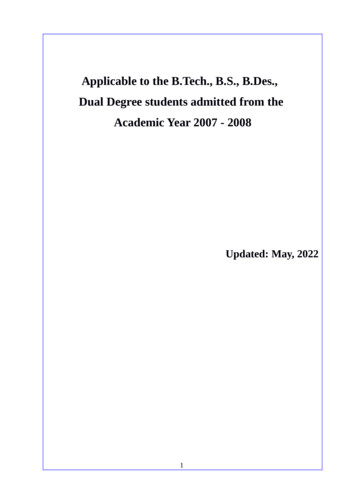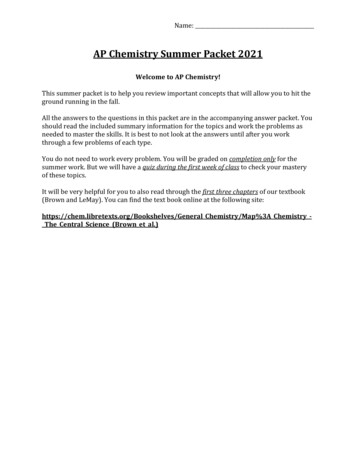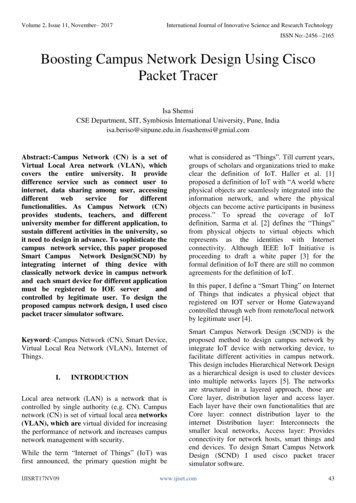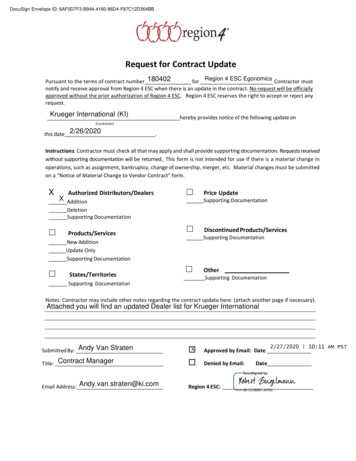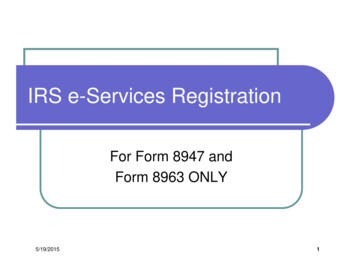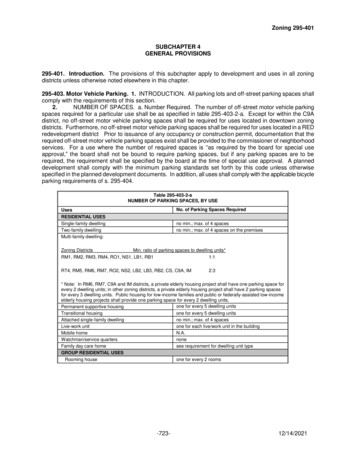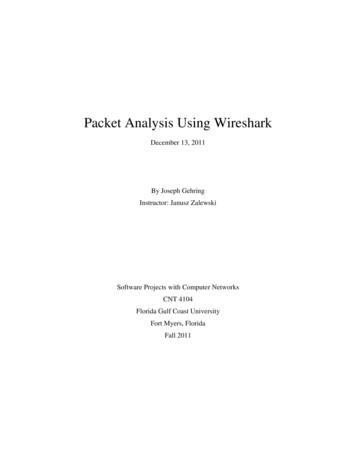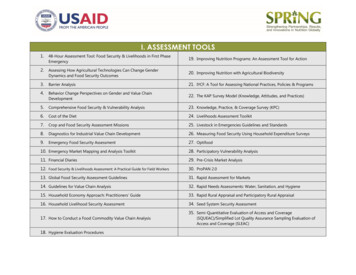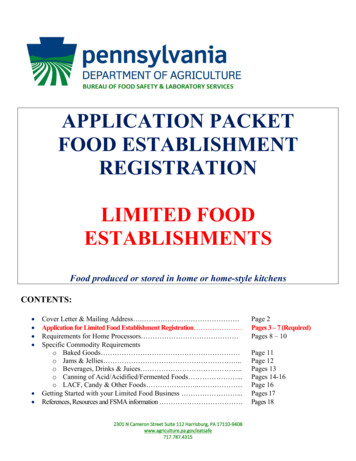
Transcription
APPLICATION PACKETFOOD ESTABLISHMENTREGISTRATIONLIMITED FOODESTABLISHMENTSFood produced or stored in home or home-style kitchensCONTENTS: Cover Letter & Mailing Address . Application for Limited Food Establishment Registration Requirements for Home Processors Specific Commodity Requirementso Baked Goods o Jams & Jellies .o Beverages, Drinks & Juices .o Canning of Acid/Acidified/Fermented Foods .o LACF, Candy & Other Foods . .Getting Started with your Limited Food Business .References, Resources and FSMA information 2301 N Cameron Street Suite 112 Harrisburg, PA 15Page 2Pages 3 – 7 (Required)Pages 8 – 10Page 11Page 12Pages 13Pages 14-16Page 16Pages 17Pages 18
FOOD ESTABLISHMENT REGISTRATION APPLICATION AND PLAN REVIEWLIMITED FOOD ESTABLISHMENTEnclosed are the necessary forms and application for obtaining a Registration as a “Limited Food Establishment” from thePennsylvania Department of Agriculture. Types of operations that would be considered “limited food establishments”may include, but are not limited to: Warehousing (storing) food on a residential property, Processing/handling food from a home -residential kitchen, Processing/handling food in a residential-style kitchen (not meeting regulatory standards), in alternate locations,such as a church, fire hall, or remodeled garage area or out-building.According to the Food Safety Act (3 Pa.C.S.A. §§5721 – 5737) “ it shall be the duty of every person operating a foodestablishment within this Commonwealth to register ”All material must be submitted at least 60 days prior to the prior to production and distribution or sale of your foodproduct. Failure to provide all required information could delay your plan review.The Department of Agriculture, Program Specialist, will review the plans and notify you of its approval/disapproval.Please allow 4 – 6 weeks for processing. Once you receive your approval, notify your Food Inspector or regional office atleast ten (10) days prior to production to arrange a registration inspection. Inquiries regarding your application statusshould be directed to 717-787-4315 or RA-AGPlanReview@pa.gov.All material must be fully completed and returned with any necessary accompanying documentation to:RA-AGPLANREVIEW@pa.govor mail / fax to:Pennsylvania Department of AgricultureBureau of Food Safety and Laboratory ServicesAttn: Plan Review2301 N. Cameron St, Room 112Harrisburg, PA 17110Fax: 717-787-1873REV 03/20222
FOOD ESTABLISHMENT REGISTRATION APPLICATION AND PLAN REVIEWLIMITED FOOD ESTABLISHMENTSECTION 1: COMPLETE AND MOVE TO SECTION 2BUSINESS INFORMATIONNAME OF BUSINESS:ADDRESS OF BUSINESS (LOCATION OF THE FOOD ESTABLISHMENT):Facility street number and nameCityStateZip codeCountyTownship/Borough( )Facility phone number( )Facility fax numberFacility email address( )Facility cell number or alternate phone numberMAILING ADDRESS (If Different Than Above):Street number and nameCityStateZip codePROPRIETOR/OWNER TYPE:SOLE PROPRIETORCORPORATIONNON-PROFIT OR ASSOCIATIONPARTNERSHIPLIMITED LIABILITY CO. (LLC) OR PARTNERSHIP (LLP)IF A “COMPANY”, A COMPANY OFFICIAL NAME & TITLE:LEGAL OWNER’S NAME BASED ON OWNER TYPE:(Examples: Mary Smith, Smith Inc., Mary’s Little League Soccer or Smith LLC)LEGAL OWNER MAILING ADDRESS (if different than above mailing address):Owner street number and nameCityStateZip code( )Owner phone number( )Owner fax numberOwner e-mail addressSECTION 2: COMPLETE AND MOVE TO SECTION 3ZONING APPROVALSYou must contact your local municipality (township office, borough office, town hall) to verify zoning approval to have a foodbusiness at this property. If you will be operating in a County Health Department, all applicable licenses/registrations issued by theCounty must be obtained BEFORE obtaining PDA license/registrations.Name of Municipality:I contacted my municipality on (date) and confirmed that I can use this property or my residential homekitchen as the location for my limited food processing business.Applicant Signature/Date:REV 03/20223
FOOD ESTABLISHMENT REGISTRATION APPLICATION AND PLAN REVIEWLIMITED FOOD ESTABLISHMENTSECTION 3:COMPLETE AND MOVE TO SECTION 4WATER, SEWER, WASTE INFORMATIONWATER: The property is on, or will use:A public / municipal water supply. Supplier: (ex: PA American Water Company)A non-public / non-municipal / private water supply (example: well water). A current water test must be provided.Your water must be tested at a Department of Environmental Protection (DEP) approved water testing laboratory ofyour choosing. Initial testing for Total Coliform (1 sample) and for Nitrate/Nitrite (1 sample) must be done andresults provided.I have attached a current water test for my non-public water supply (well) to this application.Applicant Signature/Date:SEWER: The food establishment is on:A municipal/public sewage disposal system. Name of Sewage Authority:A non-public sewage disposal system (examples; Sand mounds, holding tanks). For on-lot sewage disposal systems,please contact the certified Sewage Enforcement Officer for your municipality and discuss if the current sewage disposalsystem is appropriate for your food establishment. This would not apply if the establishment is connected to an approvedmunicipal supply, as listed above.I contacted my municipality regarding my on-lot sewage disposal system on (date). To the best of my knowledge myon-lot system is adequate for my Food Establishment and is functioning properly.Applicant Signature/Date:REFUSE:The food establishment refuse (trash) collector will be: (company name)SECTION 4: COMPLETE AND MOVE TO SECTION 5OTHER CODESSignature is required to affirm compliance with the checked requirements below. Attach any required supporting documentation.A license to collect sales tax has been obtained or applied for. For information on applying for a sales tax license, contactthe Pennsylvania Department of Revenue - (717) 787-8201. A copy of the sales tax license or proof of application isattached to this application.According to the PA Department of Revenue rules and regulations, I have determined that my business is exempt fromcollection of sales tax.*Applicant Signature/Date:I have NO animals on or in the active food establishment premises nor will there ever be so long as I am registeredas a Limited Food Establishment. (see page 4 for Pet policy)*Applicant Signature/Date:REV 03/20224
FOOD ESTABLISHMENT REGISTRATION APPLICATION AND PLAN REVIEWLIMITED FOOD ESTABLISHMENTSECTION 5: COMPLETE AND MOVE TO SECTION 6BUSINESS PLAN SUBMISSIONProvide, in writing, as an attachment to this application, your business plan. At minimum address the following, if applicable:1) Ingredient suppliers (source)2) Storage areas for equipment, food products and packaging3) Types of equipment used in the production of the food4) Production methods, including packaging methods (canning, overwrap, boxed)5) Transportation methods to other locations or for delivery of products6) How do you plan to sell the products? i.e., wholesale in state, wholesale out of state, internet, at a local farmers market, retailfrom the home, etc 7) List the addresses of all locations from which you plan to sell your products--if you are retailing your product direct to theconsumer. (ex: your home, a market, a roadside stand, local fire company, local fair)SECTION 6:COMPLETE AND MOVE TO SECTION 7PRODUCT LABEL SUBMISSIONPackaged products must have appropriate product labeling. Labeling must at minimum include:1) Name of the product2) Ingredients, listed from most to least by weight3) Allergen declaration, if needed4) Name and address of the manufacturer or distributor5) Net Wt. or count; placement on the bottom 1/3 of the primary panel and no less than 8 pt. fontBakery items made and sold directly to a Commonwealth consumer, by the baker, or their employee, (at the processing site or a satelliteof the processing site such a farmer’s market), do not require any labeling information directly on the products or any formal display ofingredients; however, ingredient information must be available upon request. Any baked goods not directly produced by the limitedfood establishment (purchased products) would require full labeling.Any food products being sold interstate must meet requirements for Nutritional Labeling and will additionally be under thejurisdiction of the US Food and Drug Administration. You should contact them directly to discuss requirements or exemptions tonutritional labels. Information can be found at www.fda.gov and searching on “Small Business Nutritional Labeling Exemption.”I have submitted a sample or draft copy of my intended label(s) for review.Applicant Signature/Date:SECTION 7:COMPLETE AND MOVE TO SECTION 8LABORATORY TESTINGThe following products will need to have product testing. This testing is to assure the safety of the product and that it is a non- TCSfood. Additionally, some testing is used to confirm branding (ex, jam vs. jelly). See “Limited Food” Establishment Requirements fordetails.NOTE: Additional testing may be required by the Department at any time to determine the safety and branding of the product. If youare unsure of what testing, if any, you must do, please contact your Regional Office for guidance. Testing must be done by you at anyfood laboratory of your choosing.1) Acid, Acidified or Fermented Foods or Beverages: pH (acidity level)2) Dressings/Sauces/Salsa: pH and Available Water (aw)3) “Moist” breads/cakes, and some pies: aw and pH4) Jams and Jellies: Potentially ‘Soluble Solid’ for product identity if requested.5) Dehydrated Foods: pH and aw6) Any questionable product: pH and awREV 03/20225
FOOD ESTABLISHMENT REGISTRATION APPLICATION AND PLAN REVIEWLIMITED FOOD ESTABLISHMENTAll laboratory test results must be submitted with this Plan Review Application. All products and product recipes must be tested. Anytime a recipe changes or a new product is produced, additional product testing must occur. Producers should keep a copy of theirproduct test results at their food establishments for review by the Food Inspector.Not applicable, I do not believe my products require testing.I have submitted a copy of my product testing results, if applicable.Applicant Signature/Date:SECTION 8:COMPLETE AND MOVE TO SECTION 9PRODUCTION INFORMATIONANTICIAPTED DAYS & TIMES OF PRODUCTION / OPERATION (check any that might apply)Please list ‘generally’ when you plan on processing / operating at this eTimeFridaySaturdaySundayTimeTimeTimeTYPE OF ESTABLISHMENT (check which one applies)This kitchen is a personal use kitchen at a homeThis kitchen is a home-style kitchen on a residential property, but not a personal use kitchenThis kitchen is a home-style kitchen not located on a residential property but another location (Fire company, church, AmericanLegion, VFW, or other)This storage/warehouse establishment is on a residential property (& not a separate structure from personal use areas).METHOD OF SALE (Check all that apply)Retail onlyWholesale onlyBoth Retail and WholesaleInternet SalesTYPE OF FOOD PRODUCTION/HANDLING (Check all that Apply)**ONLY NON-TCS FOODS CAN BE MADE/ HANDLED BY A LIMITED FOOD ESTABLISHMENT.Baked GoodsDry goodsBreadsCookiesCakesPiesVinegarsDried HerbStorage only/no handlingDressings, SaucesAcidified FoodsButters, SpreadsDehydrated foodsChocolate/fudgeHoneyBeef/Meat JerkyJams or JellyMaple Syrup/productCandyBeverage/DrinkNut mixesSpices/seasoningsOther, listDescribe your product(s): (specific types, styles, packaging methods)EMPLOYEE INFORMATION# of anticipated employees (include yourself in this number)Do you have an employee health policy?YESorNOAn employee health policy establishes how to handle ill employees, including you, should they get ill or exposed to a potentialfoodborne pathogen. What will you do for an alternative production plan should you get sick? Do you understand what illnesssymptoms you may NOT work with? If you do not have a health policy prior to opening an employee health policy must beestablished, either written or verbal.REV 03/20226
FOOD ESTABLISHMENT REGISTRATION APPLICATION AND PLAN REVIEWLIMITED FOOD ESTABLISHMENTSECTION 9:COMPLETE AND MOVE TO SECTION 10PRODUCTION OPENINGAnticipated date to begin production:DateSECTION 10:ALL APPLICANTS READ AND SIGNThis application and all other requested materials, as listed above, should be submitted to RAAGPlanReview@pa.gov or the Harrisburg Office via mail/fax, as listed on the cover letter. Please allow 4-6 weeksfor processing of your application from the date of submission. You may be contacted by the Plan Review Specialistrequesting further clarification or information and will provide you with final approval/disapproval (including thereasons) via email or mail of this application. Next, an on-site inspection must occur prior to registration andoperating.The Applicant understands and agrees that this document is an application for registration of a “limited food” establishment. Theapplicant understands and agrees that only a “proprietor” may obtain a Limited Food Establishment Registration; and that a“proprietor” may be a person, partnership, association, or corporation operating a food establishment within the Commonwealth ofPennsylvania. The applicant verifies that it is a/an (circle one): person, partnership, association, corporation, LLC or LLP; andthat it is the “proprietor” of the Limited Food Establishment that is the subject of this application. The applicant verifies that allstatements and information in this application is true and correct to the best of the applicant’s knowledge, information and belief; andmakes these statements subject to the penalties of 18 Pa.C.S.A. § 4904, relating to unsworn falsification to authorities.Following a compliant inspection and payment of the registration fee you will be permitted to produce, and/or store, and sell yourproduct. Your registration fee will be collected at the time of inspection. Your formal registration will be mailed to you within 60days. Your inspection report will serve as your official approval until the registration is received.Business Official / Owner SignaturePRINT NameDate of BirthDateThere are NO fees associated with this Application.Registration fees will be collected at the time of the inspection and are as follows:(Payable to: Commonwealth of PA)New Registrations are 35.00, at time of the first inspectionAnnual Renewal is 35.00OFFICIAL USE ONLYREGISTRATION:LIMITED FOOD PROCESSINGLIMITED FOOD STORAGESTANDARDS FOR REVIEW: Chapter 57/CFR’SAPPROVALPLANS APPROVED, DATE APPLICANT CONTACTED, DATE METHODDISAPPROVALPLANS DISAPPROVED, DATE LETTER MAILED TO APPLICANT, DATEReasons for denial:REVIEWER:**REMINDER: IN ALL CASES, A FACILITY RECORD MUST BE CREATED IN PAFOODSAFETY AND THE APPLICATION SCANNED AND ATTACHED TO THE FACILTIY RECORD.REV 03/20227
FOOD ESTABLISHMENT REGISTRATION APPLICATION AND PLAN REVIEWLIMITED FOOD ESTABLISHMENTRequirements for Home Processors-- Limited Food Establishments -The Department will allow some ‘limited’ types of food processing to occur in a “residential style kitchen,” that may notmeet the full regulatory code requirements, with the intent of the producer to offer these products for sale to the public.These processors are regulated under The Food Safety Act (3 Pa.C.S.A. §§5721 – 5737). Regulations under this Actinclude all federal regulations related to food and can be found in Title 21 of the Code of Federal Regulation (CFR’s).CFR’s can be accessed at www.ecfr.gov. In some cases, businesses may additionally be regulated under PA Code Title 7,Chapter 46, Food Code (if products are retailed direct to consumers from the business).The term “limited food processor” or “residential-style kitchen” will be used throughout this document to refer toa home-style kitchen, residential style kitchen or a personal use kitchen, regardless of the location - on or off anactual residential property.Generally, the types of production that can occur in “limited food establishments” (whether an actual home-use kitchen ora kitchen designed in a residential fashion) are limited to foods that ARE NOT foods requiring Time/Temperature Controlfor Safety (TCS food) or formerly known as potentially hazardous foods (PHF).“Time/Temperature Control for Safety Food” (TCS food) means a food that requires time/temperature control for safetyto limit pathogenic microorganism growth or toxin formation. TCS Foods include any raw or heat-treated animal foods(examples include fluid milk, dairy products, eggs, meat & poultry, fish, shellfish, and edible crustaceans), heat treatedplant food, raw seed sprouts, cut/ prepared fresh fruits & vegetables (including melons, tomatoes and salad greens), garlicin-oil products, tofu & soy-protein foods, and perishable baked goods (including cream pastries, cheesecakes and custardpies).TCS foods can only be produced in a licensed / registered ‘COMMERCIAL’ food establishment kitchen that meets the fullregulatory code requirements, including separation from residential-use areas, and adequate plumbing fixtures. This doesnot specifically prohibit processing of TCS foods from a residential property, but the foods could only be produced in asecond processing kitchen separate from the private home kitchen or any residential/personal use areas (separateentrances/ exits to food processing and storage areas are required), and that meets the full regulatory standards for a foodestablishment.Canned foods that are not acid or acidified foods (LACF foods) also cannot be made from a Limited Food Establishmentand can only be produced in a registered “COMMERCIAL’ food establishment which has been approved for canning.These types of foods are highly regulated and require specialized equipment and filing of all canning processes with FDA(US Food & Drug Administration).Bakery products, jams and jellies, acidified/fermented foods, dried mixes, and candy making are the most common types offoods from ‘limited’ food processors; however, other foods may be produced if determined to be a non-TCS food. Thisdocument will further discuss the common categories of home-processed foods. If you are unsure whether your product is aTCS food, you should discuss this with your Food Inspector. The Inspector may require you to have “questionable”products laboratory tested for pH and water activity (aw).Limited food processors generally cannot comply with the full extent of the regulations, but they do have certainrequirements and limitations to follow to meet the food safety intent of the regulation.General rules for all products are as follows: Pet Policy No animals/pets are permitted in the home at any time if the personal home kitchen is used. This would apply toresidential-style kitchens, in any other location as well.REV 03/20228
FOOD ESTABLISHMENT REGISTRATION APPLICATION AND PLAN REVIEWLIMITED FOOD ESTABLISHMENTHowever, Limited Food Establishment (LFE) registration may be allowed if a home is designed in such a way that thearea where food is processed and stored is not EVER accessible by a pet. The processing and storage area (kitchen)must be physically separated from the part of the home where pets are allowed (a physical barrier, such as a door, isrequired), AND the area must have a separate exit/entrance so the operator can bring in ingredients and take outfinished products without ever entering any areas where pets have access.Pet shall include, but is not limited to; dog, cat, bird, small animal such as a rabbit or ferret.Pet shall not include: fish, caged reptile, caged hamster or similarly confined animal, so long as the caged animal isnot located in, or in close proximity to, areas used specifically for the LFE. Children are not permitted in the kitchen area during food processing for the business.There are no mandated age limits for operators and or employees in a limited food establishment. However, membersinvolved must demonstrate basic food safety knowledge and adhere to good hygiene, processing and sanitarypractices. The water supply must be from an approved source. Private sources (not regulated by DEP) must be tested as per thefollowing PDA protocol: Initial testing for Coliform (1 sample) and Nitrate/Nitrite (1sample)Continual testing for Coliform - AnnuallyContinual testing for Nitrate/Nitrite will be based on initial results. Department approval does not imply that the business will be in compliance with any local zoning or ordinances. Allbusinesses should confirm and receive approval from their local authority for zoning and other code enforcementissues, such as sewage disposal. Registration and fee ( 35.00) by the Department of Agriculture are required. A registration fee exemption exists forHoney Processors if the honey is produced and processed on the same farm. Honey Processors will still be requiredto register and be inspected if selling off site of the processing farm. All ingredients must be separate from those for personal use (separate shelves, separate cupboards, etc ) and mustbe properly labeled, stored and protected. Proper storage includes using food-grade containers that keep pests out andmaintaining temperature control to prevent spoilage. There must be restricted use of the residential-style kitchen during any business-related food processing. Home foodpreparation and commercial food processing operations cannot be conducted at the same time. A “dual-use” kitchenrequires you to carefully schedule your time so that private and business activities do not conflict.Processors must adhere to good personnel hygiene standards and maintain sanitary conditions and practices in thekitchen and/or any storage areas. Any required laboratory testing of food products is arranged for and paid for by the producer. Although not acomprehensive list of laboratories capable of food testing, a listing of commercial laboratories is available on our website at www.agriculture.pa.gov/eatsafe. Select ‘Laboratory’ in the right-hand margin then find a link to “PAApproved Commercial Laboratories” at middle of webpage.Products must be properly labeled as follows (with some labeling exemptions for baked goods): Statement of Identity – the common or usual name of the food productName and address of manufacturer/processorIngredients listed in decreasing order by weight (including sub-ingredients)Allergen declaration if neededNet weight or unit count.REV 03/20229
FOOD ESTABLISHMENT REGISTRATION APPLICATION AND PLAN REVIEWLIMITED FOOD ESTABLISHMENT Nutritional labeling must be included on food products being shipped / sold in interstate commerce (across statelines). Most Limited Food Establishments will qualify for a small business exemption from nutritional labelingrequirements but must apply with FDA. Information and the exemption application can be found n/ucm2006867.htm Any labeling for health claims such as Low Fat, Sugar Free, Gluten Free, Dairy Free, and similar, must be accurateand be supported by manufacturer’s labeling of sub ingredients or through product testing. By adding a claim to yourlabel, you may be required to comply with Nutritional Labeling requirements. Contact FDA as noted in #11 above. Processors must comply with all applicable state and federal laws and regulations. Under the Food Safety Modernization Act (FSMA), food facilities which wholesale may be required to register withFDA (section 415 of the FD&C Act (21 U.S.C. 350d).There are certain exemptions for businesses operated from a private residence, and for businesses whose primary salesare retail (direct to consumers).For more information contact FDA at 1-800-216-7331or 301-575-0156 or visit their websiteat: ilityRegistration/default.htm** This is not a complete list of the types of foods that may be allowed to be made in a limited food establishment.Products are evaluated individually, as to whether or not they can be produced in a limited food establishment.REV 03/202210
FOOD ESTABLISHMENT REGISTRATION APPLICATION AND PLAN REVIEWLIMITED FOOD ESTABLISHMENTBAKED GOODSBaking is the most common type of food processing conducted in a limited food establishment. Traditional bakery itemsproduced include but not limited to cakes, breads, bagels, cookies, rolls, muffins, brownies, biscuits/ biscotti, tortilla andmost fruit pies/ pastries, etc.Perishable baked goods (TCS food) are NOT allowed to be prepared in the limited food establishment and may includeitems such as cheesecakes, pumpkin pies, cream/custard or meringue pastries/ pies and desserts, pudding prepared from amix or scratch, or any food item that has sufficient moisture, high pH (low acidity, pH 4.6) and/or ingredients that willsupport the growth of pathogenic microorganisms. TCS foods may also include baked good containing meat or cheeses.Generally, any product which is not shelf-stable at room temperature and requires refrigeration after preparation would beconsidered TCS food. Most baked goods do not require testing; however, baked goods in question, shall be tested forpH and Available Water (aw) by the producer. Evaluation of the product will be made by the Food Inspectorfollowing the submission of the results.Bakery items made and sold directly to a Commonwealth consumer, by the baker (or their employee), do not require anylabeling information directly on the products or any formal display of ingredients; however, ingredient informationmust be available upon request. Any baked goods not directly produced by the limited food establishment (purchasedproducts) would require full labeling.Items sold at a retail facility, not owned or operated by the baker; require one of the following forms of labeling:(1) Packaged Bakery Product must have all required labeling information on the package.(2) Loose/ Bulk-Displayed Bakery Product must have all required label information posted by the display.(3) Bakery Products sold at retail facilities, for consumption on the premises, such as a restaurant, require that the labelinformation be available to the consumer upon request.Any item labeled with a claim such as Gluten Free, Dairy Free, Organic, Sugar Free or similar must be able to substantiatethe that claim through manufacturer’s labeling of sub-ingredients or through product testing. The Code of FederalRegulations (CFRs) has specific guidelines regarding under what circumstances these claims may be made. Use of claimsmay require a nutritional facts panel.REV 03/202211
FOOD ESTABLISHMENT REGISTRATION APPLICATION AND PLAN REVIEWLIMITED FOOD ESTABLISHMENTJAMS, JELLIES & SIMILAR PRODUCTSProducers of jams and jellies must have written recipes/ formulas and procedures.No testing is required if producers of jams/ jellies are using the standard recipes contained in one of the following guides:1. The Ball Blue Book – Guide to Preserving.2. USDA Complete Guide to Home Canning - National Center for Home Food Preservation.3. A University Extension Service: e.g. http://extension.psu.edu/food/preservationHowever, anytime the standard recipe is altered or a new recipe is developed, the final product of each recipe must bereviewed and analyzed by a food testing laboratory for soluble solids (Brix) to identify if the product is correctlyidentified for their Standard of Identity (21 CFR 150).oooUse only clean and sanitary equipment/ utensils and adhere to good manufacturing and personal hygiene practices(to prevent cross-contamination and allergen cross-contact).Use only new lids. Re-used jars may be allowed but they must be thoroughly washed and sanitized.All labeling requirements on the containers must be met. Jam, jelly and preservatives not meeting a properStandard of Identify may need evaluated further.The soluble-solids content of the finished jelly or jam may not be less than 65 percent (65% Brix), as determined by themethod prescribed in the "Official Methods of Analysis of the AOAC" 13th Ed. (1980), section 31.011, under "Solids byMeans of Refractometer--Official Final Action,"o Fruit jellies have 45 parts by weight of the fruit component to each 55 parts of the sweetener solids (45:55). Thefinished soluble solids content of a jelly is not less than 65%.o Fruit preserves and jams are divided into two groups, generally the berries and the pomes. Those made from the berry group require 47 parts by weight of the fruit component to 55 parts of the sugar(47:55). Those made from the pomes require 45 parts by weight of the fruit component to 55 parts of the sugar (45:55).In both cases the finished product is not less than 65% solids.o Fruit butters, preserves, artificially sweetened fruit jelly, each have specific standards of identity and soluble solidrequirements.o Conserves, Marmalades, and “Spreads” do not have standards of identity, and do not require soluble-solids testing.REFERENCE & RESOURCES Fruit butter, Jellies, Preserves and related products (21 CFR Part fdocs/cfcfr/CFRSearch.cfm?CFRPart 150 USDA complete guide to Home Canning - National Center for Home Food lications usda.html The Ball Blue Book – Guide to Preserving: http://www.freshpreserving.com/recipes/ Penn State Extension (Home Food Preservation): http://extension.psu.edu/food/preservationREV 03/202212
FOOD ESTABLISHMENT REGISTRATION APPLICATION AND PLAN REVIEWLIMITED FOOD ESTABLISHMENTBEVERAGES / DRINKS / JUICESSome beverages and drinks can possibly be made from a lim
Pages 18 . FOOD ESTABLISHMENT REGISTRATION APPLICATION AND PLAN REVIEW LIMITED FOOD ESTABLISHMENT REV 03/2022 2 Enclosed are the necessary forms and application for obtaining a Registration as a "Limited Food Establishment" from the . Sauces Honey Beef/Meat Jerky Breads Cookies Acidified Foods Jams or Jelly Maple Syrup/product Cakes Pies .
